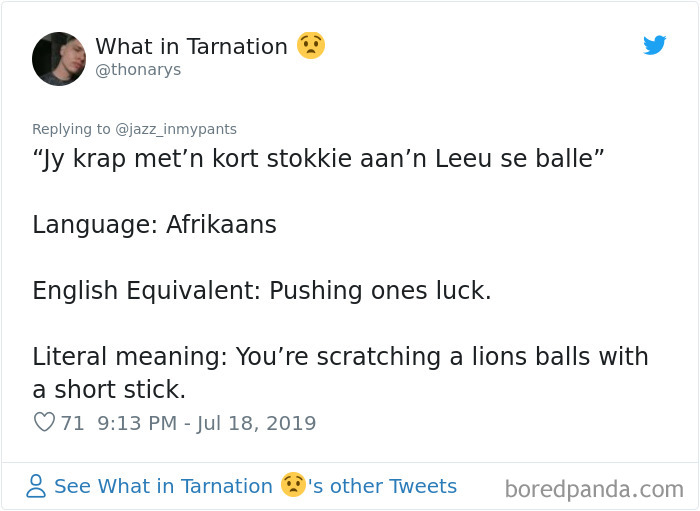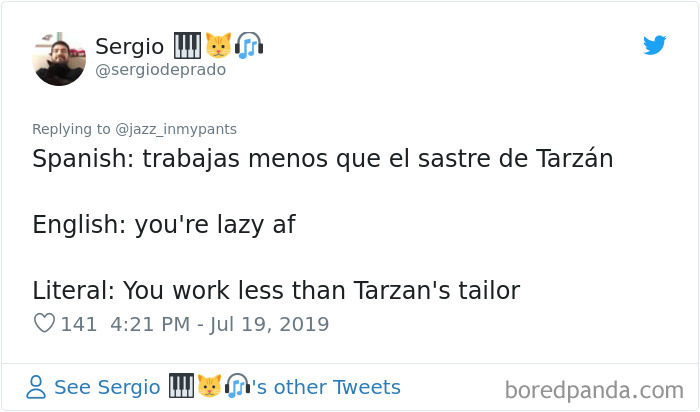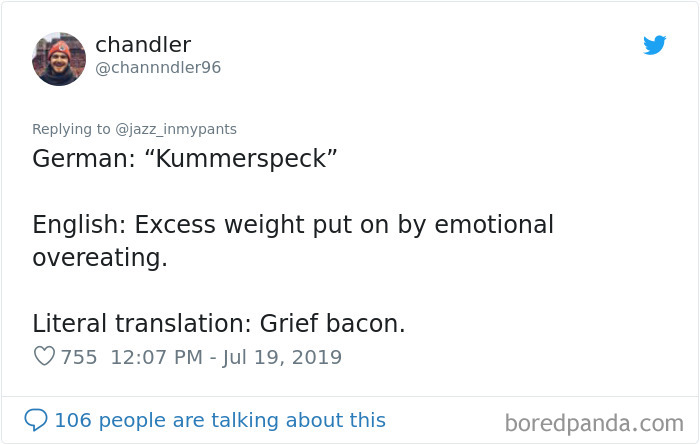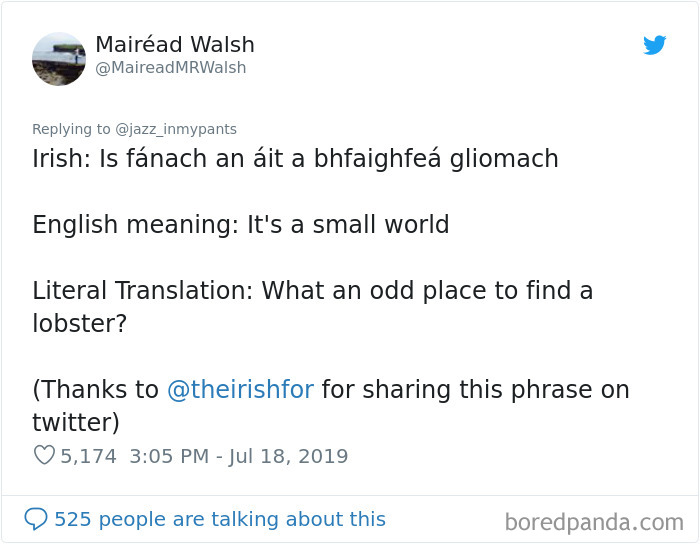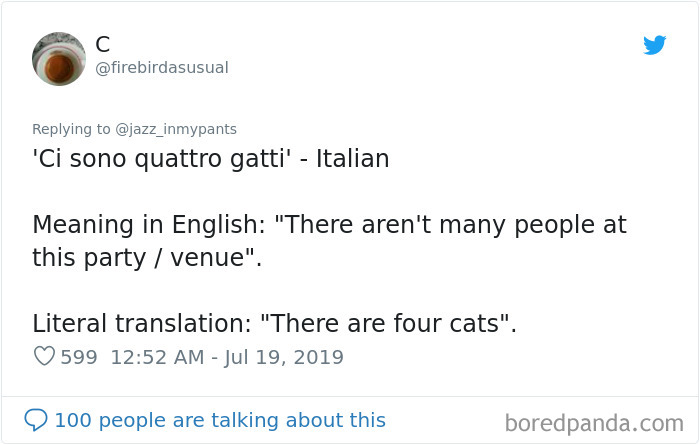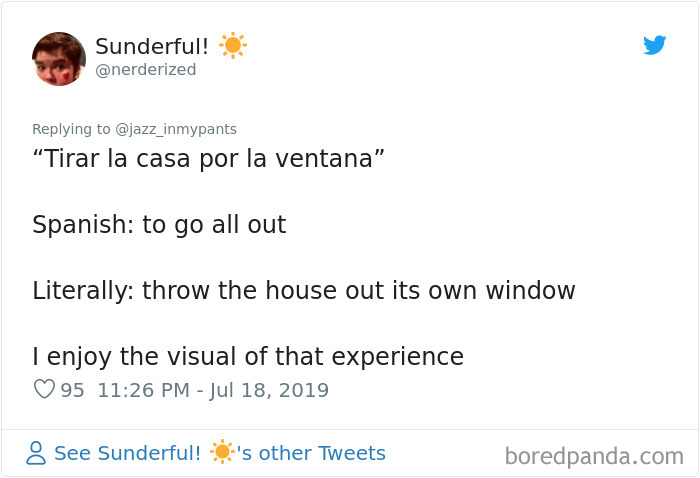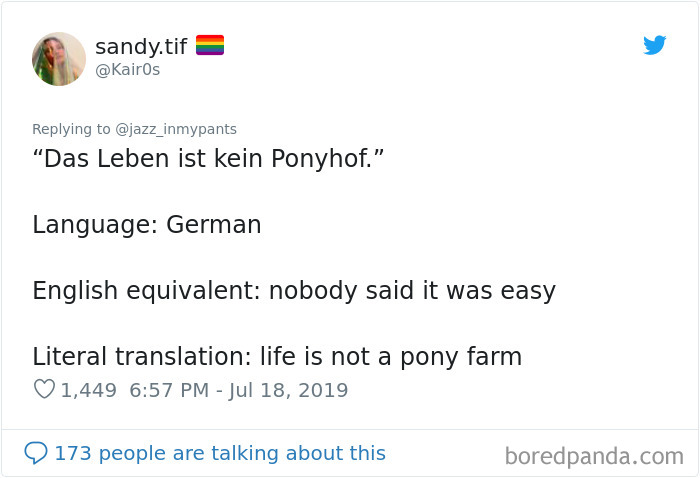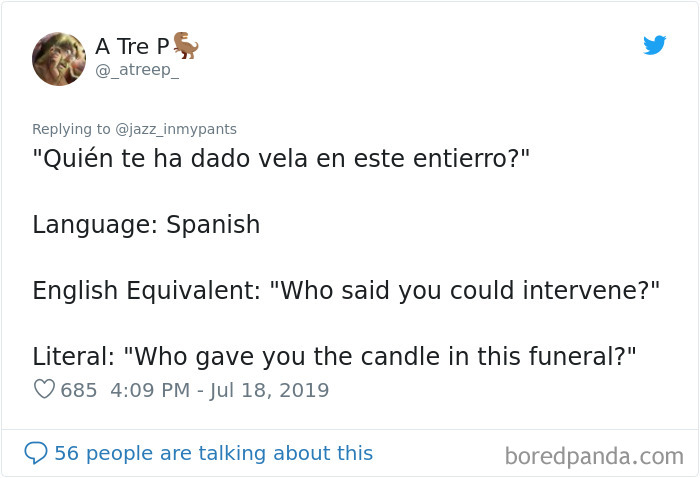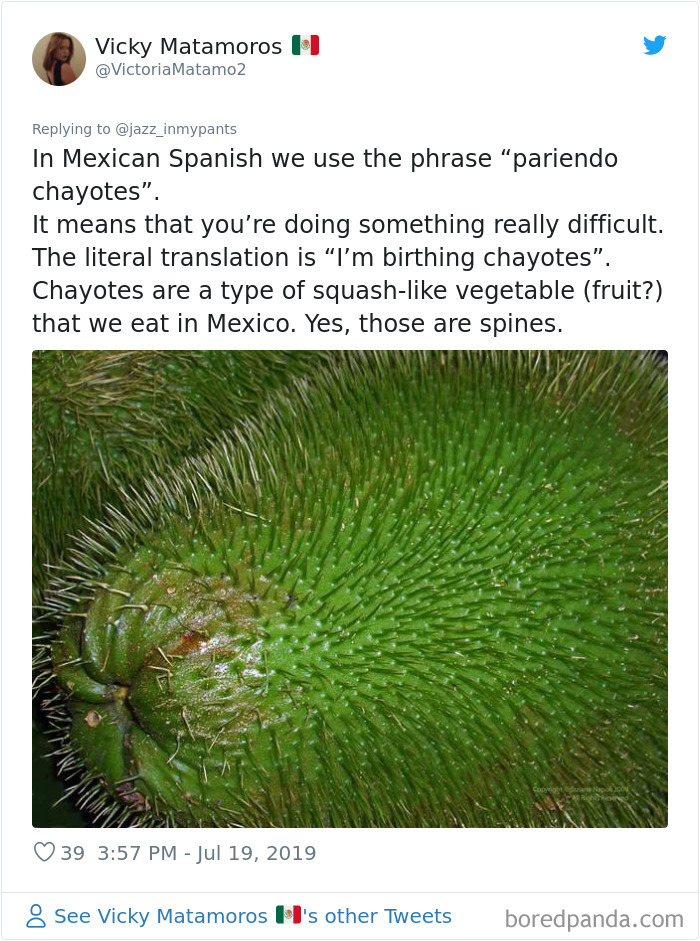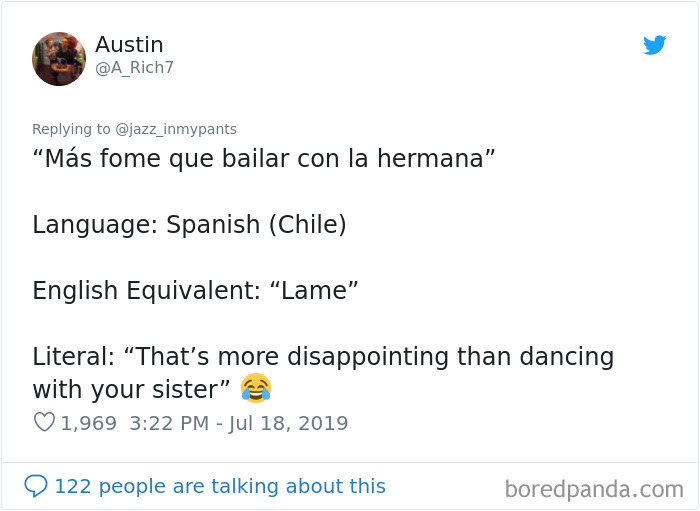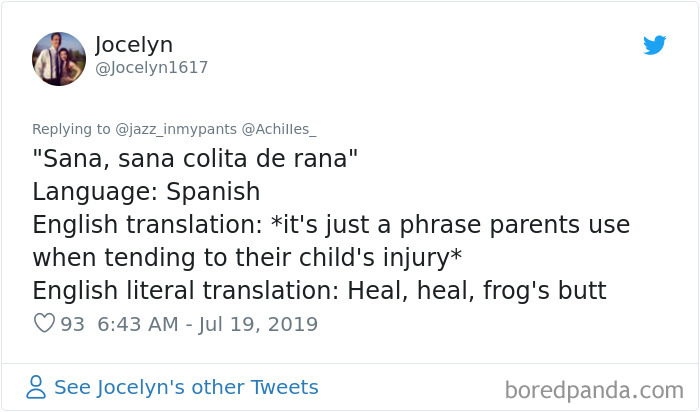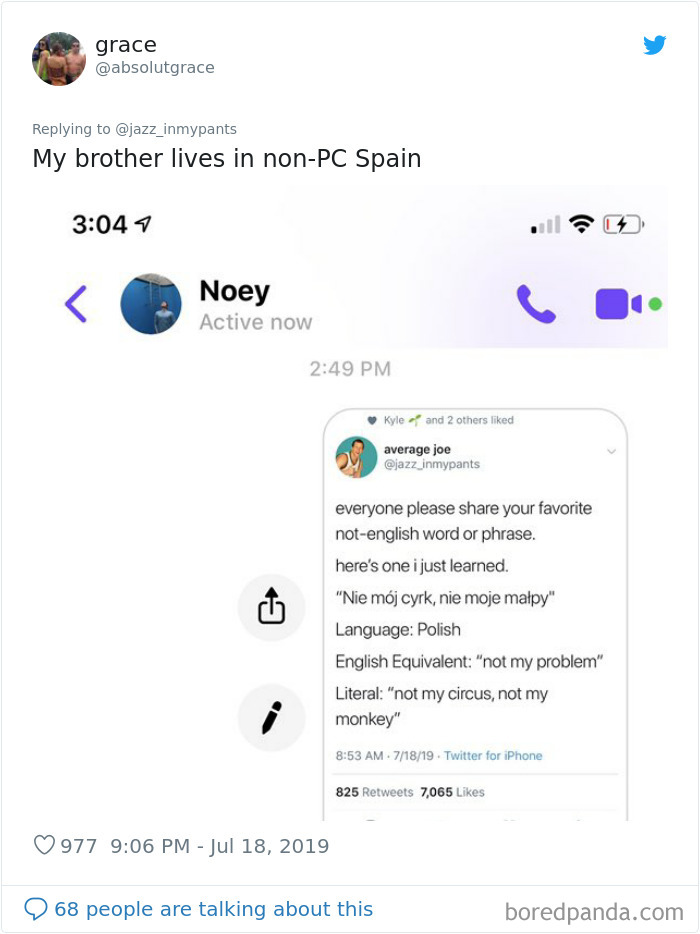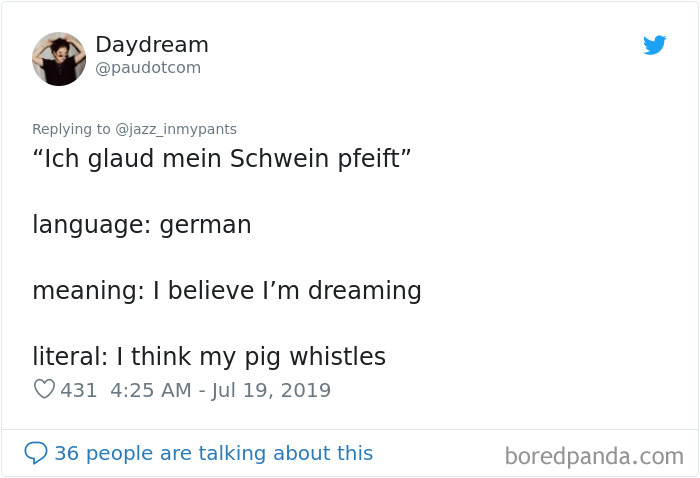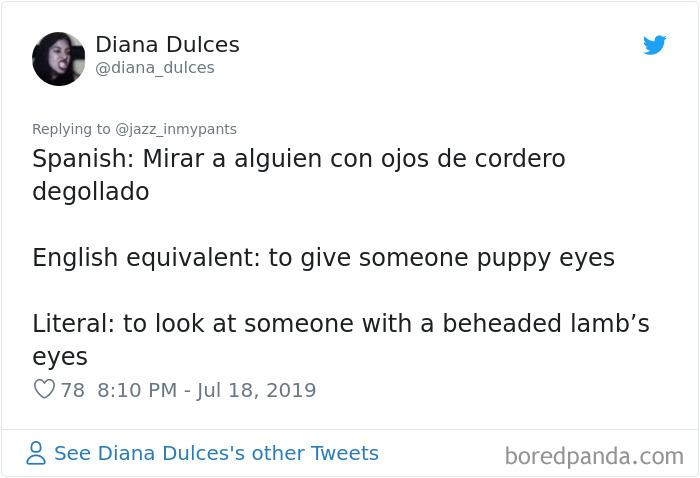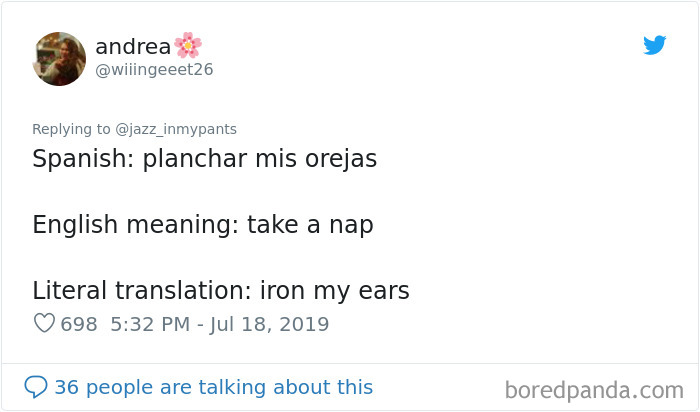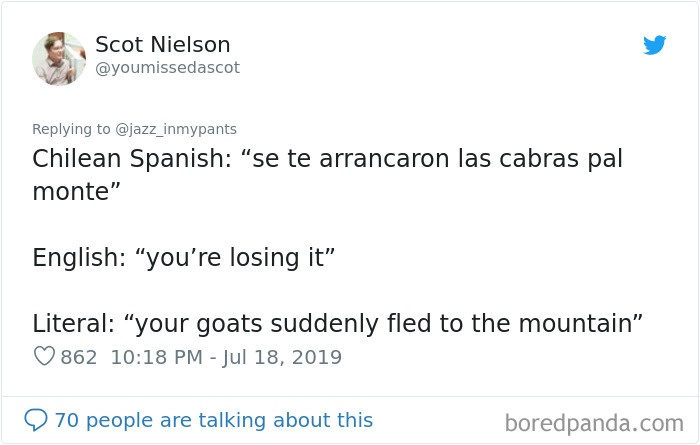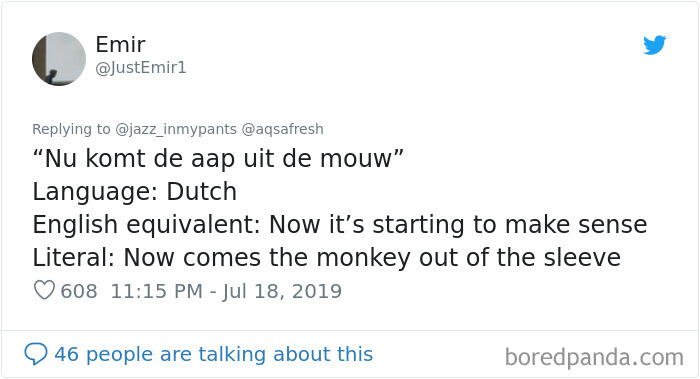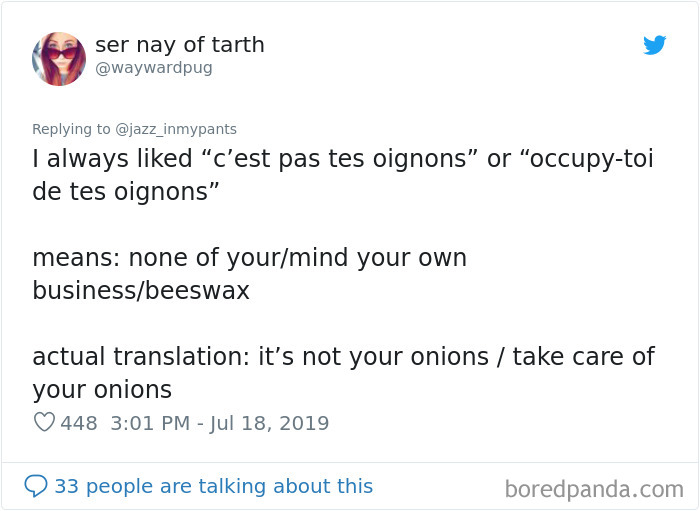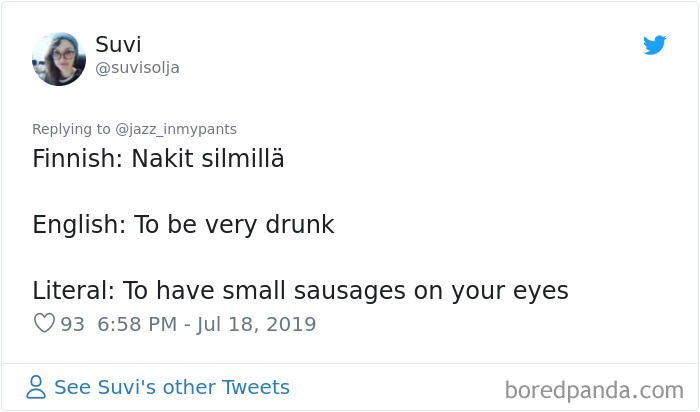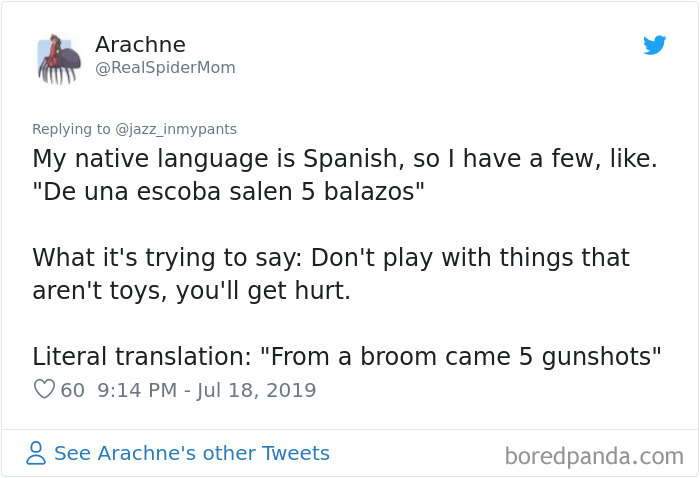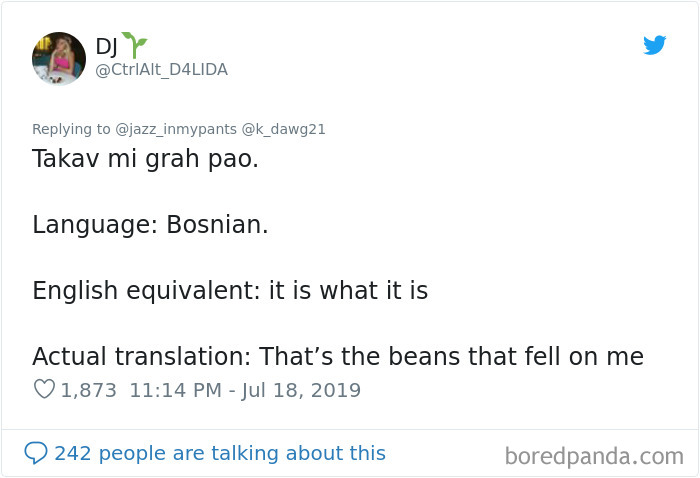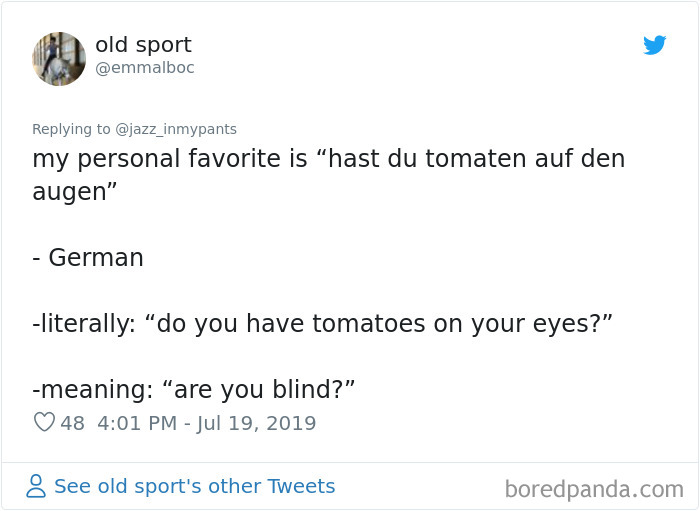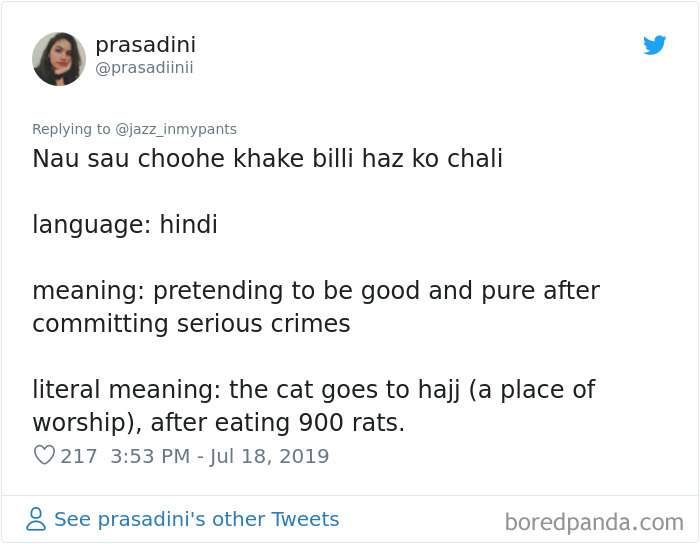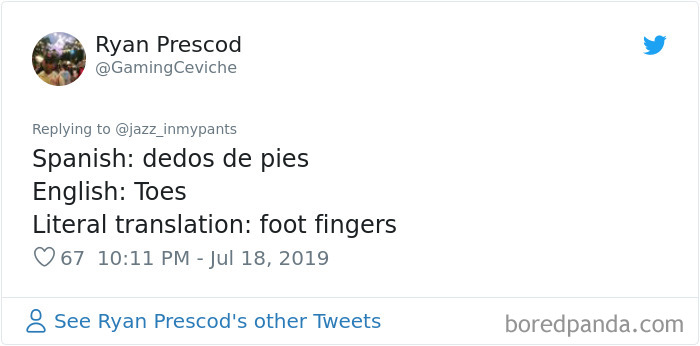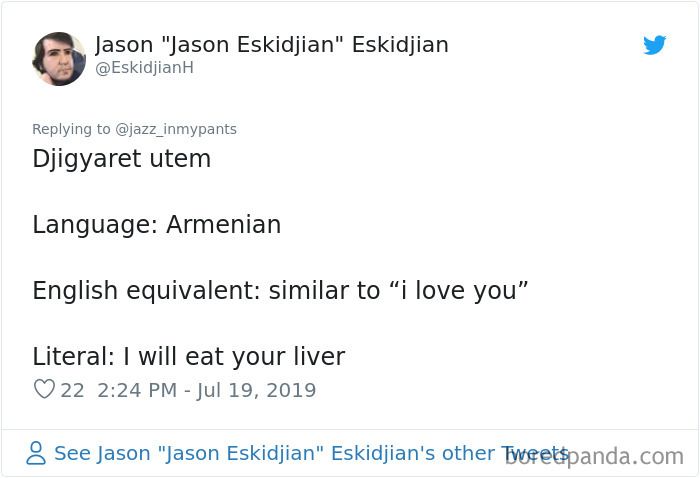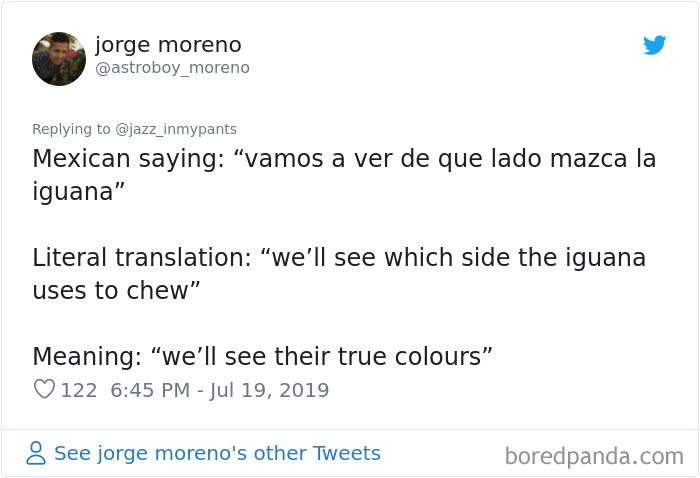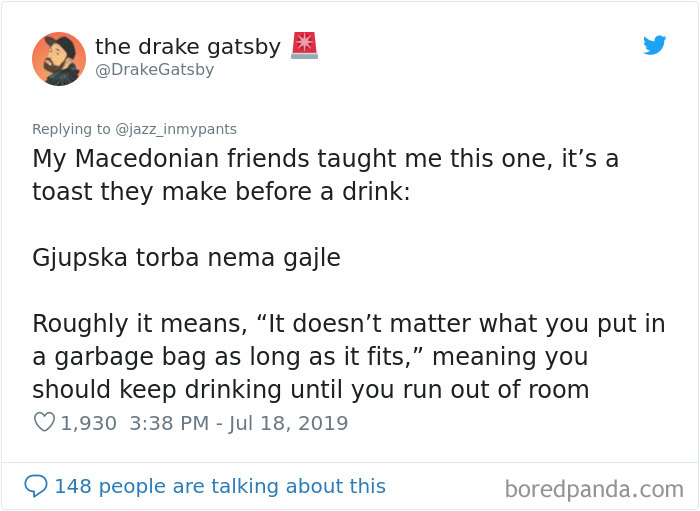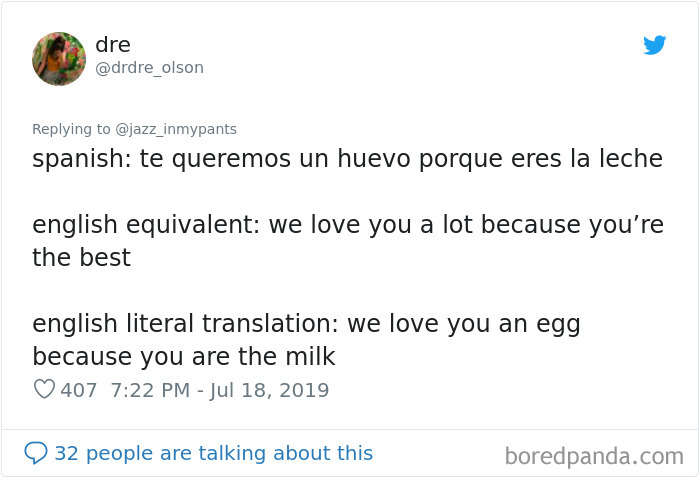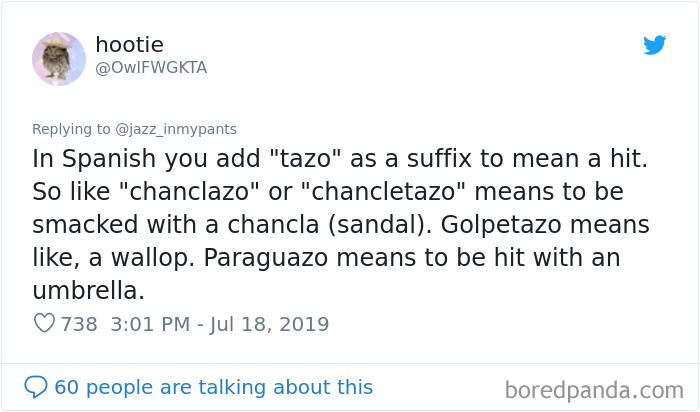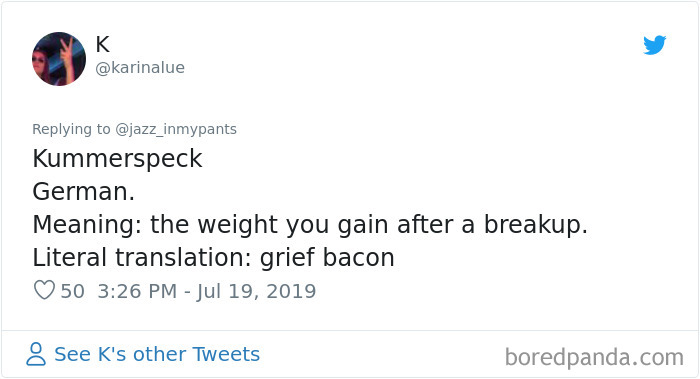Everyone can agree, especially non-native speakers, that the English language can get very tricky. Most of us know the feeling of being puzzled by the strange spelling rules and grammar of this language, but the truth is, every native language has its own peculiarities. So if you think that the funny idioms in English are bad enough, check out this hilarious Twitter thread of the weirdest phrases and their literal meanings.
Started by the Twitter user @jazz_inmypants who asked people to share their favorite non-English funny sayings, the thread was quickly filled with unexpected responses, most of them reminding us how strange some mother tongues are. Scroll below to read the idioms and their meanings.

More info: twitter.com
This post may include affiliate links.
"Bacon" is not really correct. "Speck" is the fatty part of bacon, therefore you can also refer to you belly fat as "Speck" instead of "Fett" (fat). Literal translation: grief fat
The real quote actually is "great minds think alike, though fools seldom differ"
It should be written "wurst" instead of "Wurst". The noun Wurst means Sausage but the adjective wurst means it doesn't matter. (In German all nouns start with an uppercase letter.)
There are a lot of funny descriptions for remote or unattractive places in germany. Such as "Da liegt der Hund begraben" (This is where the dog has been buried) or "Da willst du nicht tot überm Zaun hängen" (You don't want to hang dead over the fence)
Being Mexican I heard this a lot as a child. Trying to explain this to my non-Spanish speaking friends was really funny.
I usually say "Febo asoma", which would translate to something like "morning has broken" or something (febo is another name for the sun).
I'm just going to say "your goats have run to the mountain!"
Perkele, the legendary Finnish way of drinking! https://youtu.be/NAl9OyGYxOg
in italy, instead of healthy as a horse, they say healthy as a fish. an american once mocked my paesana, saying that it was stupid to change it to a fish, and she looked dead at him and said "I don't know, there's an awful lot of sick/dying horse movies, but i've never seen a fish sneeze"
It's the same in Norwegian, because both words for "healthy" and "fish", rhymes: Frisk som en fisk.
Load More Replies...Two of my favorite German idioms are missing, both of which have no short English equivalent. One is "innerer Schweinehund" (lit. inner pig-dog), roughly meaning "the lazy part of oneself". Procrastinating, staying inside when it's raining, taking he car instead of walking... that's all the doing of your "inner pig-dog" :) The other one is "eierlegende Wollmilchsau" (lit. egg-laying wool milk sow), meaning something that a) does and has everything you want and b) doesn't exist (not sure if "unicorn" refers to quite the same).
I really like "Das ist ja zum Mäuse melken." - "That's as if you are trying to get milk from mice." meaning something is very difficult and frustrating.
Load More Replies...Phrase: "Som na vážkach." Language: Slovak English phrase: "I am unable to decide for myself." Literal: "I am on dragonflies."
Im Italian so we have plenty of expressions that roughly translated means something different, however my favourite is french : "Les chiens aboient, la caravane passe" which is a sentence used to mean when an individual stick with his opinion, lead on uncaring of comments. But it means "The dog barked, but the caravan proceeded"
It's so interesting to see that many popular sayings are similiar in very different cultures and languages! Loved it.
In my part of Norway, well atleast my family, when we dont understand someones tast or what other likes we say "Smaken er som baken, den har to sider." which roughly translates to "the taste is like the butt, it has two sides."
What a wonderful place to add something. @BP: bring pack those series where we can add stuff!
I actually tried to make a post like this! But I never made a post here and couldn't find a way to make an ask-the-readers post, and figured that maybe such a function is only available for a select group of people... I would love, love, love to read more of these idioms.
Load More Replies...Few from Czech: Ospalý jako kotě which translates to Sleepy as kitten. Ožralý jako doga = drunk as Great Dane.
My boss taught me the phrase "Tā shìgè huāpíng". In Mandarin, it means "She's a vase." Basically, "She's pretty to look at but offers nothing inside."
In Germany we say: You can't eat from an empty plate.
Load More Replies...Danish: der ugler i mosen. English: I have a bad feeling about this. literal : there are owls in the marsh.
Another Dutch one: "Tomaten zijn duur" (Tomatoes are expensive) to indicate someone's blushing.
In Spanish it's said "you're like a tomato" to say someone is blushing -not sure about their price ;) -
Load More Replies...A very short one: "Helaas Pindakaas" Language: Dutch Meaning: "Unfortunately" Literal Meaning: "Unfortunately Peanut butter"
And pindakaas literally means "peanut cheese" which makes it even better.
Load More Replies..."Not my circus, not my monkey" I hear a lot in English... have heard people use it in several states, so I don't even think it's a regional thing.
My favorite is the Brazilian Portuguese saying of "Puta Que Pariu!" It is an expression to say you are seriously screwed ! But literally it means "the whore gave birth!" Haha
Danish: "Der er ingen ko på isen" English translation: Everything is under control / there is no problem here Literal: There is no cow on the ice
Funny, because in German for solving a big problem we use the phrase: Die Kuh vom Eis holen. Getting the cow off the ice.
Load More Replies...My mother used to scold me and my brother with (Spanish) "Juegos de los manos, son juegos de los marranos" (Literal) " Games of the hands are games of the pigs". Basically, "Quit your horseplay".
Oh, we say "Juego de manos, juego de villanos" or games of the hands, games of delinquents.
Load More Replies...In Quebec we say "Il ne se prend pas pour une chique de gomme" which roughly translate as "He don't think of himself as chewed bubble gum", meaning he's arrogant and/or vain.
Another one (this is too much fun!) "Il lui manque une couple de bardeaux" translate as "He's missing a few shingles", meaning he's crazy or odd.
Load More Replies...Norwegian: Det er ugler i mosen English: There is owls in the moss Means: It’s something strange/suspicious here
In German we quote Shakespeare: Something is rotten in (the state of) Denmark. Es ist etwas faul im Staate Dänemark.
Load More Replies...Slovak: kašli na to ||English meaning: forget about it, it's not a big deal ||Literal translation: cough on it
A Norwegian phrase "å være i kritthuset" which means to be on someone's good side. Literal translation: to be in the chalk-house
There is a Swedish phrase that goes "skite i det blå skåpet" which means to f**k up, but the literal translation is "too poop in the blue closet"
Swedish: Goddag, yxskaft! This literally means 'hello, axe handle' but is used to point out that the response or reaction you got was totally irrelevant.
... and if you want to call someone a damned idiot you would probably say "djävla skitstövel", damned s**t boot ;P
Load More Replies...Danish: Stå med håret i postkassen....it means to be let down. Literally: To stand with your hair in the mail Box.
That must be from when you were waiting by the mailbox to get news from a loved one. I wonder if the younger generation will be able to relate to this.
Load More Replies...Norwegian: (Å) gå over bekken etter vann. Meaning: To do something in an overly complicated or time-consuming way. Literal: (To) cross the brook [in order] to fetch water.
My grandfather often said "Sie trägt seine Eier in der Handtasche" - she is carrying his balls in her purse.
German: Wer Feuer isst, scheißt Funken Meaning: You get what you deserve Literal: He who eats fire, shits sparks
One of my favourite "insults" from Spain is "bocachancla", which literally translates into sandal-mouth in English. Its closest meaning would be chatter-box or motor-mouth.
Why sandals? Is it because they always make sound (think flip flops) or has it another meaning?
Load More Replies...We have one in bangla, "Mohisher shamney bin bajano". The figurative meaning is explaining something to someone who doesn't care to understand or appreciate. The literal meaning is to play a flute for the Buffalo to hear.
Braz. Portuguese: 1.ele bateu as botas (He kicked the boots) = he died. 2. Ele só fala abobrinhas (he just says zucchinis) = all of he says is nonsense or dumb stuff. 3. Tirar leite de pedra (to take milk out of rocks) = to extract/do something great out of very limited resources.
Bulgarian: като препикано мушкато English: you look like s**t Literal English: like a pissed over gerranium 😂😂😂
Slovak: kašli na to English meaning: forget about it, it's not a big deal Literal translation: cough on it
Three portuguese: "Foi feito para inglês ver" - used when something is built just for pretence. Real meaning "it was made for english people to watch". |. "Não olhes com a ponta dos dedos" - Watch but don't touch. Real meaning: "Don't watch with the tips of your fingers". |. "Fia-te na virgem e não fujas" - Sarcastic thing to say when someone is having false expectancies and refuses to move on. Real meaning "Rely on the virgin (Mary) and don't run"
In Filipino, there's a phrase that goes "Bahala na si Batman," which is used to imply that the outcome of something is being left to chance/ whatever happens, happens. Translated in English though, it's "Batman will take care of it" or "It's now up to Batman."
I'm pretty sure I've heard someone say "Not my circus, not my monkey" or something close at some point in my life.
In Polish we say: " Gdzie psy dupami szczekają" which means a very remote, islolated place. Literal translation: " Where the dogs bark with their asses" :D
A woman needs a man like a fish needs a bicycle. If a man needs a woman then his mom must have kicked him out of the house.
In Germany you say "ich könnte Bäume ausreißen", "I could pull out trees", to indicate you are felling particularily well and healthful
My favorite French expression is il pet plus haut que son cul. Meaning he thinks he’s so great. Translation is he farts higher than his a*s.
I don’t know the words in my language (Igbo in Nigeria) but there are some great sayings and proverbs. Also in other local languages like Yoruba, etc. Of foolhardiness... 1. The coward sits comfortably in his house and points out to his grandchildren the smoking ruins where the brave man once lived 2. He who volunteers his head for breaking the coconut will not live to partake of it
Finnish: kaikkeen tottuu paitsi jääpuikkoon perseessä. The saying means something like "you'll get used to it". Literally: one can get used to everything except to an icicle in your a*s
Il y a du monde au balcon. Language: French Meaning: she’s got big tits Literal meaning: there’s a crowd on the balcony
My old time favourite in Chilean Spanish: no confíes ni en tus dientes por que estos te muerden la lengua aveces. Translation: do not trust anybody. Literary translation: you shouldn't even trust your teeth, because these bite your tongue sometimes!
Turkish: tedariksiz abdest bozan domala domala taş arar "who shits without supply, seeks for a rock on all four" if you start a job without preparation, you may find yourself in a har situation
As if English proverbs are not weird enough... “there are many ways to skin a cat” why the hell would you want to skin a cat????
tempat jin buang anak, litterary meang "where genie throw away their kid" mean "very remote place"
indonesian "tempat jin buang anak" literrary "where genie throw away their kids" meaning "very remote place"
I've always loved the phrase "Ya nos cayó el chahuistle!" (The 'chahuistle' has fallen upon us!). That mean that something bad happend suddenly, or bearing caught doings something wrong. (like if you were trying to skip a class and the teacher caught you in mid-act).
In Danish we Say 'ingen ko på isen, which means: No problem. Literally it translates to: There's no cow on the ice😊
"W dupie byłeś, gówno widziałeś" in Polish. It means: you have absolutely no knowledge or experience in topic discussed. Literal meaning: You've been in the a*s and you've seen s**t.
We have a sentence in Bahasa Indonesia : Guru kencing berdiri,murid kencing berlari . In English Equvalent : Everything you teach for your student,they will believe at all without ask . While literally : Teacher pissed stand off,student had pissed running
in italy, instead of healthy as a horse, they say healthy as a fish. an american once mocked my paesana, saying that it was stupid to change it to a fish, and she looked dead at him and said "I don't know, there's an awful lot of sick/dying horse movies, but i've never seen a fish sneeze"
It's the same in Norwegian, because both words for "healthy" and "fish", rhymes: Frisk som en fisk.
Load More Replies...Two of my favorite German idioms are missing, both of which have no short English equivalent. One is "innerer Schweinehund" (lit. inner pig-dog), roughly meaning "the lazy part of oneself". Procrastinating, staying inside when it's raining, taking he car instead of walking... that's all the doing of your "inner pig-dog" :) The other one is "eierlegende Wollmilchsau" (lit. egg-laying wool milk sow), meaning something that a) does and has everything you want and b) doesn't exist (not sure if "unicorn" refers to quite the same).
I really like "Das ist ja zum Mäuse melken." - "That's as if you are trying to get milk from mice." meaning something is very difficult and frustrating.
Load More Replies...Phrase: "Som na vážkach." Language: Slovak English phrase: "I am unable to decide for myself." Literal: "I am on dragonflies."
Im Italian so we have plenty of expressions that roughly translated means something different, however my favourite is french : "Les chiens aboient, la caravane passe" which is a sentence used to mean when an individual stick with his opinion, lead on uncaring of comments. But it means "The dog barked, but the caravan proceeded"
It's so interesting to see that many popular sayings are similiar in very different cultures and languages! Loved it.
In my part of Norway, well atleast my family, when we dont understand someones tast or what other likes we say "Smaken er som baken, den har to sider." which roughly translates to "the taste is like the butt, it has two sides."
What a wonderful place to add something. @BP: bring pack those series where we can add stuff!
I actually tried to make a post like this! But I never made a post here and couldn't find a way to make an ask-the-readers post, and figured that maybe such a function is only available for a select group of people... I would love, love, love to read more of these idioms.
Load More Replies...Few from Czech: Ospalý jako kotě which translates to Sleepy as kitten. Ožralý jako doga = drunk as Great Dane.
My boss taught me the phrase "Tā shìgè huāpíng". In Mandarin, it means "She's a vase." Basically, "She's pretty to look at but offers nothing inside."
In Germany we say: You can't eat from an empty plate.
Load More Replies...Danish: der ugler i mosen. English: I have a bad feeling about this. literal : there are owls in the marsh.
Another Dutch one: "Tomaten zijn duur" (Tomatoes are expensive) to indicate someone's blushing.
In Spanish it's said "you're like a tomato" to say someone is blushing -not sure about their price ;) -
Load More Replies...A very short one: "Helaas Pindakaas" Language: Dutch Meaning: "Unfortunately" Literal Meaning: "Unfortunately Peanut butter"
And pindakaas literally means "peanut cheese" which makes it even better.
Load More Replies..."Not my circus, not my monkey" I hear a lot in English... have heard people use it in several states, so I don't even think it's a regional thing.
My favorite is the Brazilian Portuguese saying of "Puta Que Pariu!" It is an expression to say you are seriously screwed ! But literally it means "the whore gave birth!" Haha
Danish: "Der er ingen ko på isen" English translation: Everything is under control / there is no problem here Literal: There is no cow on the ice
Funny, because in German for solving a big problem we use the phrase: Die Kuh vom Eis holen. Getting the cow off the ice.
Load More Replies...My mother used to scold me and my brother with (Spanish) "Juegos de los manos, son juegos de los marranos" (Literal) " Games of the hands are games of the pigs". Basically, "Quit your horseplay".
Oh, we say "Juego de manos, juego de villanos" or games of the hands, games of delinquents.
Load More Replies...In Quebec we say "Il ne se prend pas pour une chique de gomme" which roughly translate as "He don't think of himself as chewed bubble gum", meaning he's arrogant and/or vain.
Another one (this is too much fun!) "Il lui manque une couple de bardeaux" translate as "He's missing a few shingles", meaning he's crazy or odd.
Load More Replies...Norwegian: Det er ugler i mosen English: There is owls in the moss Means: It’s something strange/suspicious here
In German we quote Shakespeare: Something is rotten in (the state of) Denmark. Es ist etwas faul im Staate Dänemark.
Load More Replies...Slovak: kašli na to ||English meaning: forget about it, it's not a big deal ||Literal translation: cough on it
A Norwegian phrase "å være i kritthuset" which means to be on someone's good side. Literal translation: to be in the chalk-house
There is a Swedish phrase that goes "skite i det blå skåpet" which means to f**k up, but the literal translation is "too poop in the blue closet"
Swedish: Goddag, yxskaft! This literally means 'hello, axe handle' but is used to point out that the response or reaction you got was totally irrelevant.
... and if you want to call someone a damned idiot you would probably say "djävla skitstövel", damned s**t boot ;P
Load More Replies...Danish: Stå med håret i postkassen....it means to be let down. Literally: To stand with your hair in the mail Box.
That must be from when you were waiting by the mailbox to get news from a loved one. I wonder if the younger generation will be able to relate to this.
Load More Replies...Norwegian: (Å) gå over bekken etter vann. Meaning: To do something in an overly complicated or time-consuming way. Literal: (To) cross the brook [in order] to fetch water.
My grandfather often said "Sie trägt seine Eier in der Handtasche" - she is carrying his balls in her purse.
German: Wer Feuer isst, scheißt Funken Meaning: You get what you deserve Literal: He who eats fire, shits sparks
One of my favourite "insults" from Spain is "bocachancla", which literally translates into sandal-mouth in English. Its closest meaning would be chatter-box or motor-mouth.
Why sandals? Is it because they always make sound (think flip flops) or has it another meaning?
Load More Replies...We have one in bangla, "Mohisher shamney bin bajano". The figurative meaning is explaining something to someone who doesn't care to understand or appreciate. The literal meaning is to play a flute for the Buffalo to hear.
Braz. Portuguese: 1.ele bateu as botas (He kicked the boots) = he died. 2. Ele só fala abobrinhas (he just says zucchinis) = all of he says is nonsense or dumb stuff. 3. Tirar leite de pedra (to take milk out of rocks) = to extract/do something great out of very limited resources.
Bulgarian: като препикано мушкато English: you look like s**t Literal English: like a pissed over gerranium 😂😂😂
Slovak: kašli na to English meaning: forget about it, it's not a big deal Literal translation: cough on it
Three portuguese: "Foi feito para inglês ver" - used when something is built just for pretence. Real meaning "it was made for english people to watch". |. "Não olhes com a ponta dos dedos" - Watch but don't touch. Real meaning: "Don't watch with the tips of your fingers". |. "Fia-te na virgem e não fujas" - Sarcastic thing to say when someone is having false expectancies and refuses to move on. Real meaning "Rely on the virgin (Mary) and don't run"
In Filipino, there's a phrase that goes "Bahala na si Batman," which is used to imply that the outcome of something is being left to chance/ whatever happens, happens. Translated in English though, it's "Batman will take care of it" or "It's now up to Batman."
I'm pretty sure I've heard someone say "Not my circus, not my monkey" or something close at some point in my life.
In Polish we say: " Gdzie psy dupami szczekają" which means a very remote, islolated place. Literal translation: " Where the dogs bark with their asses" :D
A woman needs a man like a fish needs a bicycle. If a man needs a woman then his mom must have kicked him out of the house.
In Germany you say "ich könnte Bäume ausreißen", "I could pull out trees", to indicate you are felling particularily well and healthful
My favorite French expression is il pet plus haut que son cul. Meaning he thinks he’s so great. Translation is he farts higher than his a*s.
I don’t know the words in my language (Igbo in Nigeria) but there are some great sayings and proverbs. Also in other local languages like Yoruba, etc. Of foolhardiness... 1. The coward sits comfortably in his house and points out to his grandchildren the smoking ruins where the brave man once lived 2. He who volunteers his head for breaking the coconut will not live to partake of it
Finnish: kaikkeen tottuu paitsi jääpuikkoon perseessä. The saying means something like "you'll get used to it". Literally: one can get used to everything except to an icicle in your a*s
Il y a du monde au balcon. Language: French Meaning: she’s got big tits Literal meaning: there’s a crowd on the balcony
My old time favourite in Chilean Spanish: no confíes ni en tus dientes por que estos te muerden la lengua aveces. Translation: do not trust anybody. Literary translation: you shouldn't even trust your teeth, because these bite your tongue sometimes!
Turkish: tedariksiz abdest bozan domala domala taş arar "who shits without supply, seeks for a rock on all four" if you start a job without preparation, you may find yourself in a har situation
As if English proverbs are not weird enough... “there are many ways to skin a cat” why the hell would you want to skin a cat????
tempat jin buang anak, litterary meang "where genie throw away their kid" mean "very remote place"
indonesian "tempat jin buang anak" literrary "where genie throw away their kids" meaning "very remote place"
I've always loved the phrase "Ya nos cayó el chahuistle!" (The 'chahuistle' has fallen upon us!). That mean that something bad happend suddenly, or bearing caught doings something wrong. (like if you were trying to skip a class and the teacher caught you in mid-act).
In Danish we Say 'ingen ko på isen, which means: No problem. Literally it translates to: There's no cow on the ice😊
"W dupie byłeś, gówno widziałeś" in Polish. It means: you have absolutely no knowledge or experience in topic discussed. Literal meaning: You've been in the a*s and you've seen s**t.
We have a sentence in Bahasa Indonesia : Guru kencing berdiri,murid kencing berlari . In English Equvalent : Everything you teach for your student,they will believe at all without ask . While literally : Teacher pissed stand off,student had pissed running

 Dark Mode
Dark Mode 

 No fees, cancel anytime
No fees, cancel anytime 













